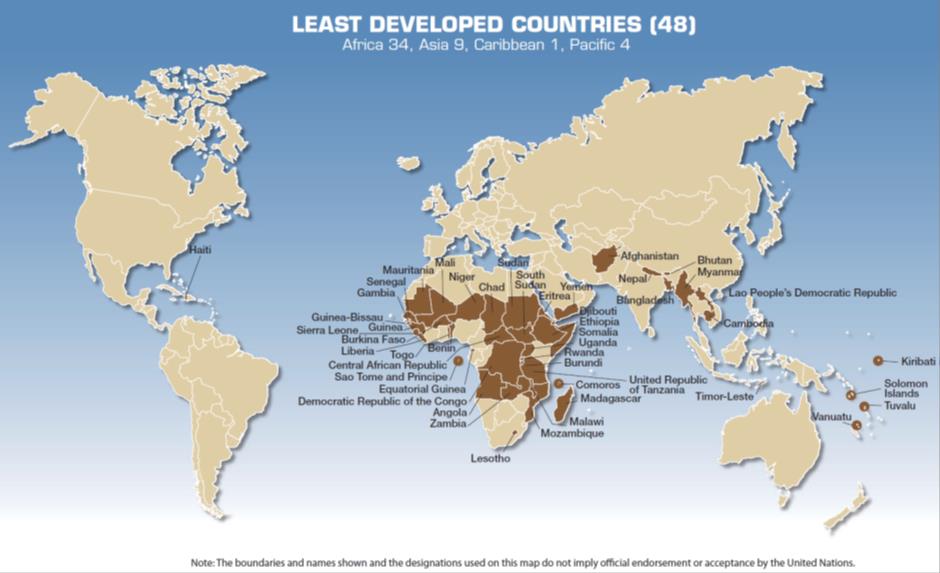UNCTAD The Least Developed Countries Report 20151
Forty-eight countries are currently designated by the United Nations as "least developed countries" (LDCs), entitling them to aid, preferential market access and special technical assistance, among other concessions. LDCs are distributed among the following regions:
Africa (34): Angola, Benin, Burkina Faso, Burundi, Central African Republic, Chad, Comoros, Democratic Republic of the Congo, Djibouti, Equatorial Guinea, Eritrea, Ethiopia, Gambia, Guinea, Guinea-Bissau, Lesotho, Liberia, Madagascar, Malawi, Mali, Mauritania, Mozambique, the Niger, Rwanda, Sao Tome and Principe, Senegal, Sierra Leone, Somalia, South Sudan, the Sudan, Togo, Uganda, United Republic of Tanzania, and Zambia.
Asia (9): Afghanistan, Bangladesh, Bhutan, Cambodia, Lao People's Democratic Republic, Myanmar, Nepal, Timor-Leste, and Yemen.
Caribbean (1): Haiti.
Pacific (4): Kiribati, Solomon Islands, Tuvalu, and Vanuatu.
The list of LDCs is reviewed every three years by the Economic and Social Council of the United Nations (ECOSOC), based on recommendations by the Committee for Development Policy (CDP). In March 2015, the CDP recommended the graduation of Angola, by virtue of the "income-only" graduation rule (see below). Equatorial Guinea and Vanuatu are scheduled to be taken off of the list in June 2017 and December 2017 respectively.
Since the category was defined forty years ago, four countries have graduated from LDC status: Botswana in December 1994; Cabo Verde in December 2007; Maldives in January 2011; and Samoa in January 2014. In March 2012, the CDP recommended Tuvalu's graduation from LDC status but in the absence of an endorsement by ECOSOC, this recommendation has not come into effect.
Establishing the LDC list and graduation from LDC status
The following three criteria were used by the CDP in the latest review of the list in March 2015:
(a) Per capita income, based on a three-year average estimate of the gross national income (GNI) per capita, with a threshold of $1,035 for possible cases of addition to the list, and a threshold of $1,242 for cases of graduation from LDC status
(b) Human assets, involving a composite index (the Human Assets Index) based on indicators of (i) nutrition (percentage of the population that is undernourished), (ii) health (child mortality rate), (iii) school enrolment (gross secondary school enrolment ratio) and (iv) literacy (adult literacy rate)
(c) Economic vulnerability, involving a composite index (the Economic Vulnerability Index) based on indicators of (i) natural shocks (index of instability of agricultural production, and share of the population that has been victimized by natural disasters), (ii) trade-related shocks (index of instability of exports of goods and services), (iii) physical exposure to shocks (share of the population living in low-lying areas), (iv) economic exposure to shocks (share of agriculture, forestry, and fisheries in gross domestic product, and index of merchandise export concentration), (v) smallness (population in logarithm), and (vi) remoteness (index of remoteness)
For all three criteria, different thresholds are used for identifying cases of addition to and graduation from the ranks of LDCs. A country will qualify to be added to the list if it meets the addition thresholds on all three criteria and does not have a population greater than 75 million.
A country will normally qualify for graduation from LDC status if it has met the graduation thresholds of at least two of the three criteria during the period covered by at least two consecutive three-yearly CDP reviews of the list.
However, if the per capita GNI of an LDC has risen to a level at least double the graduation threshold, the country will be deemed eligible for graduation regardless of its performance under the other two criteria (the "income only" graduation rule).

Report: http://unctad.org/en/PublicationsLibrary/ldc2015_en.pdf



